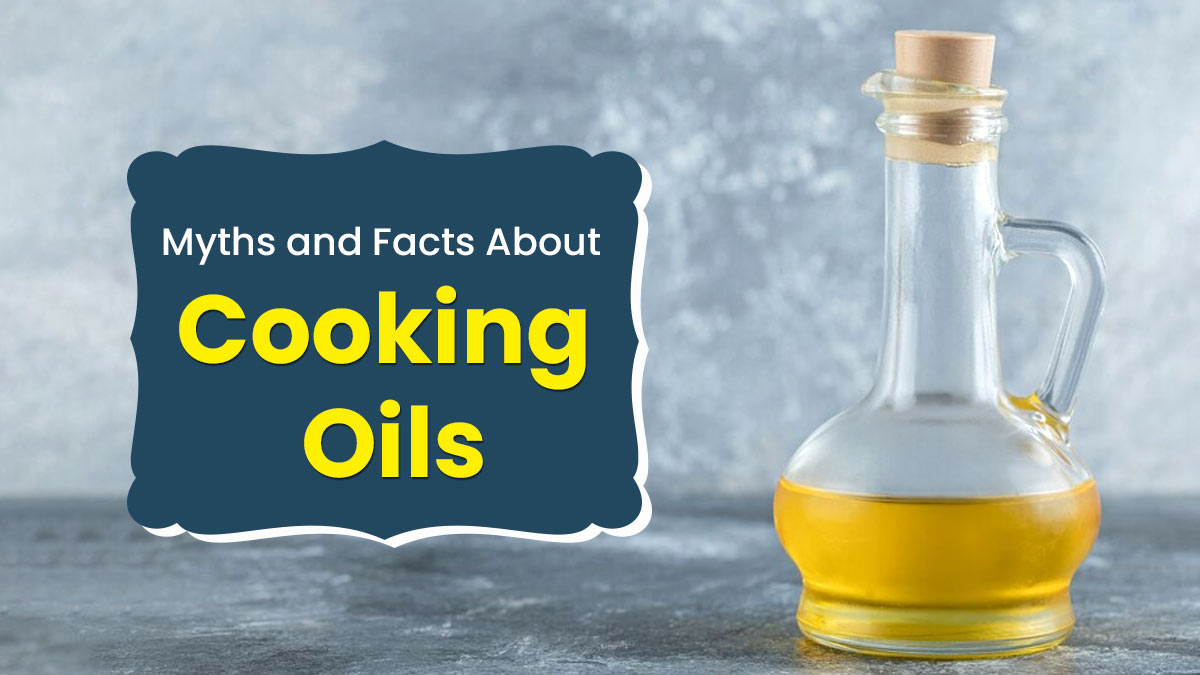
For years, the topic of cooking oils has been surrounded by confusion, with many of us unsure about what to believe. You've probably heard advice that ranges from 'avoid oil completely' to 'all oils are bad for you.' It’s hard to know what’s true with so much mixed information. The good news? Not all oils are unhealthy, and some can support your health when used the right way. We spoke to our expert Dr Twincy Ann Sunil, Clinical Dietician/Nutritionist, Apollo Spectra Hospitals, Koramangala, Bengaluru, who debunked myths about cooking oils and stated the facts.
Table of Content:-
Myths and Facts About Cooking Oils
Myth 1: All Oils Are Unhealthy

According to a 2021 study, cooking oils and fats, derived from either plant or animal sources, are commonly used in cooking and salad preparation across the globe. Vegetable oils are considered a healthier option due to their higher content of unsaturated fats compared to animal oils.
“One common food myth is that oils are not good for health. The truth is, oils are very different, nutritionally speaking, and the health effects of oil depend on its specific composition,” said Dr Sunil.
For example, oils high in monounsaturated fats, such as olive oil, promote cardiovascular health. Olive oil contains a high amount of antioxidants and anti-inflammatory agents that have been shown to have health-promoting properties, including an improvement in cardiovascular health and a reduction of the risk for chronic diseases.
“On the other hand, excessive oil consumption, especially oils high in saturated fats, such as palm oil, can lead to increased cholesterol levels. Another important point is the difference between occasional use and incorporating oils as a primary fat source in a diet. It's important to be mindful of your oil intake, and daily use should be moderate and balanced,”highlighted Dr Sunil.
Also Read: Heart-Healthy Cooking Oils To Lower Risk Of Heart Problems
Myth 2: One Should Avoid All Oils to Lose Weight

Another common myth is that to maintain body weight, one must avoid all kinds of oil. However, this is not true. Yes, fats are indeed very calorie-dense, but they provide the important omega-3 and omega-6 fatty acids that are essential for a person's health. Avocados, nuts, and seeds are foods containing healthy fats. These help regulate cell structure, hormone production, and brain function.
“However, the addition of a food that contains healthy oil in moderation can benefit weight management as it helps serve their most important purpose: feeling satiated so as not to consume higher amounts of less nutrient-dense foods. It's all about choosing high-quality oils and using only what's needed,” added Dr Sunil.
Myth 3: Cooking with Oils Is Dangerous

“Some people worry that frying with oils will create toxic compounds. In reality, certain compounds do form when oils heat up. However, it all comes down to the type of oil one is using and how one cooks it since different varieties have different smoke points,” said Dr Sunil.
Avocado and light olive oil burn at very high temperatures and are less likely to break down due to heat into harmful substances. This can be mitigated by using oils within their recommended temperature ranges and not overheating them too much. To maintain an overall healthy diet, one can use various oils in balance and moderate their consumption of unhealthy oils.
Also Read: Did You Know About These Risks Of Reheating Cooking Oil? Check Out Risks And Ways To Avoid It
Message From The Expert
Oils are not inherently bad or good, they are a tool that can either support or undermine your health depending on how they are used. “The key is to focus on quality, moderation, and variety. Incorporating heart-healthy oils like olive oil into a balanced diet while minimising the use of highly processed oils can support overall wellness,” said Dr Sunil.
Each type of oil serves a specific purpose in a balanced diet. For instance, olive oil is ideal for salads or low-heat cooking and promotes heart health. Avocado oil is suitable for high-heat cooking and adds healthy fats to your meals. Additionally, coconut oil is recommended for quick energy and is commonly used in baking, but it should not exceed one spoonful per day. This is because coconut oil contains high levels of saturated fats, which can elevate LDL cholesterol levels and increase the risk of heart disease if consumed excessively.
“As with most things in nutrition, it’s about balance and making informed choices. Thus, instead of avoiding or believing all oils are unhealthy, opt for healthier options and enjoy them as part of a nutritious, balanced diet,” added Dr Sunil.
[Disclaimer: This article contains information provided by an expert and is for informational purposes only. Hence, we advise you to consult your own professional if you are dealing with any health issues to avoid complications.]
Also watch this video
How we keep this article up to date:
We work with experts and keep a close eye on the latest in health and wellness. Whenever there is a new research or helpful information, we update our articles with accurate and useful advice.
Current Version